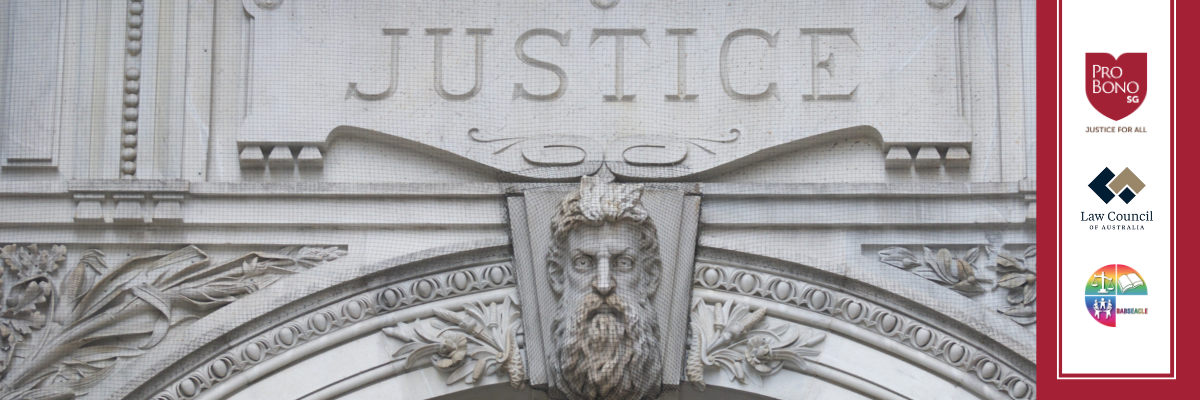
2026 Access to Justice Exchange
The Role of Bar Associations/Law Societies in Supporting Pro Bono Workshop
Empowering Justice: The Role of Bar Associations/Law Societies in Supporting Pro Bono
by Pro Bono SG
Introduction
Access to justice remains a critical challenge for the most vulnerable and needy segments of society in Asia. Pro bono legal services are essential in bridging this gap, ensuring justice is accessible to all, irrespective of socio-economic status. Bar associations play a pivotal role in this ecosystem, providing the necessary framework, encouragement, and support for legal professionals to engage in pro bono work.
Background
Bar Associations throughout Asia have concentrated on attempting to support their members who have the capacity to realise their pro bono ethical obligations to work pro bono with varying degrees of success. It is both a key member service and public benefit undertaking. The varying degrees of success in these efforts highlight the complex landscape of pro bono legal work across different jurisdictions, each with its unique challenges and opportunities.
Building upon this foundation, the workshop has become a cornerstone of the annual Asia Access to Justice Exchange (A2JX), gaining momentum and support from a network of key bar association members both from within Asia and the global legal community.
This initiative stands as a testament to the collective commitment to bolstering pro bono services, drawing upon years of accumulated wisdom, experiences, and the evolving best practices in the field.
By institutionalizing this workshop as a core initiative, we harness the synergy of past participants and workshops, aiming to spotlight not only the steadfast efforts of bar associations in pro bono advocacy but also the dynamic strategies that bridge the gap between those in need of pro bono legal services and the legal professionals eager to provide them.
This year’s workshop seeks to further this legacy, offering a platform to showcase ongoing and new best practices in pro bono support, fostering a collaborative environment where impactful strategies are shared, refined, and implemented.
Date: 7 December 2026
The workshop will be held in Fukuoka, Japan.
Objectives of the Workshop:
The workshop aims to raise awareness about the crucial role of bar associations in promoting and facilitating pro bono legal services in Asia. It will highlight successful case studies and best practices from the region, provide practical guidance on engaging and supporting legal professionals in pro bono work, and encourage collaboration to enhance pro bono support across Asia.
1. Highlight the Crucial Role of Bar Associations/Law Societies: The workshop will emphasize the importance of bar associations in promoting and facilitating pro bono legal services, showcasing their potential to make significant contributions to societal well-being.
2. Showcase Success Stories: Inspiring case studies and best practices will be shared from across the region, demonstrating the impactful outcomes of effective pro bono initiatives.
3. Provide Practical Guidance: actionable insights and strategies for bar associations to motivate and support legal professionals in their pro bono endeavors will be offered.
4. Foster Collaboration: The creation of a platform for interactive discussions, experience sharing, and networking, thereby building a community of practice that strengthens pro bono services across Asia.
5. Inspire Action: The workshop will encourage the formulation and commitment to concrete actions and policies that enhance the support for pro bono work within the legal community.
Registration Fees
| Registration | Early BirdFeb 1 - Mar 31 | RegularApr 1 - Aug 31 | LateSep 1 - Nov 15 |
|---|---|---|---|
| In-Person | $125.00 | $150.00 | $175.00 |
| Virtual | $30.00 | $40.00 | $50.00 |
Registrations may be closed early if maximum capacity is reached.
Target Audience:
The workshop is designed for bar association leaders/officers/policy makers, and staff members, as well as all lawyers with an interest in the provision of efficient pro bono service delivery, specialist committees and groupings of lawyers and students, not for profit organisations who use pro bono services, government officials engaged in supporting the access to justice/rule of law sector, and those non-lawyers whose clients need pro bono services.
Format
The workshop will move from plenary to break out sessions around the objectives set. Participants will be encouraged to both engage with expert presenters during the former, and bring the experience of their own jurisdictions to the latter.
The detailed agenda will be released soon.